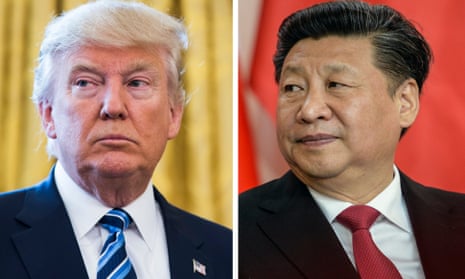The White House has rebuffed claims that Donald Trump was left empty-handed by his decision not to challenge Chinese president Xi Jinping over China’s claims to Taiwan.
Before taking power Trump, who has called China a US “enemy”, had hinted he might shred decades of policy towards the democratically-ruled island, which Beijing regards as a breakaway province, unless China’s leaders offered trade concessions.
Trump’s appointment of several notorious China hawks fuelled fears he would follow through on such threats and usher in a potentially dangerous new era of US-China relations.
However, the US billionaire president back-pedaled during his first conversation with Xi on 9 February, sparking heated debate over whether he had capitulated to his Chinese counterpart or in fact managed to secretly negotiate some unknown deal.
On Monday White House press secretary Sean Spicer declined to detail what, if any, concessions Trump might have secured from the Chinese in exchange for his compliance over Taiwan.
“The president is not one to discuss his negotiating tactics,” Spicer said, according to Politico.
However, asked if “he got something”, Spicer replied: “The president always gets something”.
Spicer’s comments came as China’s top diplomat, Yang Jiechi, met with Trump and his team in Washington amid speculation the two leaders could hold their first face-to-face meeting at the G20 summit in Hamburg in early July.
Xinhua, China’s official news agency, said Yang had held talks with Trump’s son-in-law and senior adviser Jared Kusher, chief strategist Steve Bannon, national security adviser HR McMaster and vice-president Mike Pence during a trip designed “to exchange views on how to promote the China-US ties and other issues of mutual concern”.
Yang, a longstanding acquaintance of the Bush family and former ambassador to Washington who some know as ‘Tiger Yang’, also held a brief meeting with Trump that one US official told Reuters had lasted “five to seven minutes”.
According to Xinhua, Trump told Yang he had been “very happy” to hold a “very important” phone call with Xi and pledged to enhance cooperation “in all areas”.
Trump’s public hostility to China on issues including trade, Taiwan, North Korea and the South China Sea has left specialists concerned that a destabilizing downturn in relations is on the horizon.
However, Bruce Gilley, a China specialist at Portland State University, said he was optimistic Trump and Xi would be able to thrash out a mutually beneficial relationship.
“I think they are in some ways cut from the same cloth. They are no-nonsense people. They both behave like business leaders. The difference is that Trump is in a system that still constrains him and Xi is not.”
Gilley said Xi’s anti-western tendencies meant he would not attempt to “befriend” the United States as his predecessors Jiang Zemin and Deng Xiaoping had sought to do.
Deng famously donned a ten-gallon hat during a historic bridge-building 1979 tour of the US while Jiang hit the beach and took a hula dancing class during a 1997 trip to Hawaii that was designed to heal the divisions that had opened up as a result of the 1989 Tiananmen massacre.
“[But] Xi has shown prior to Trump that when he wants to turn on the charm he can,” Gilley added. “In some ways being hands off is not a bad thing.”
